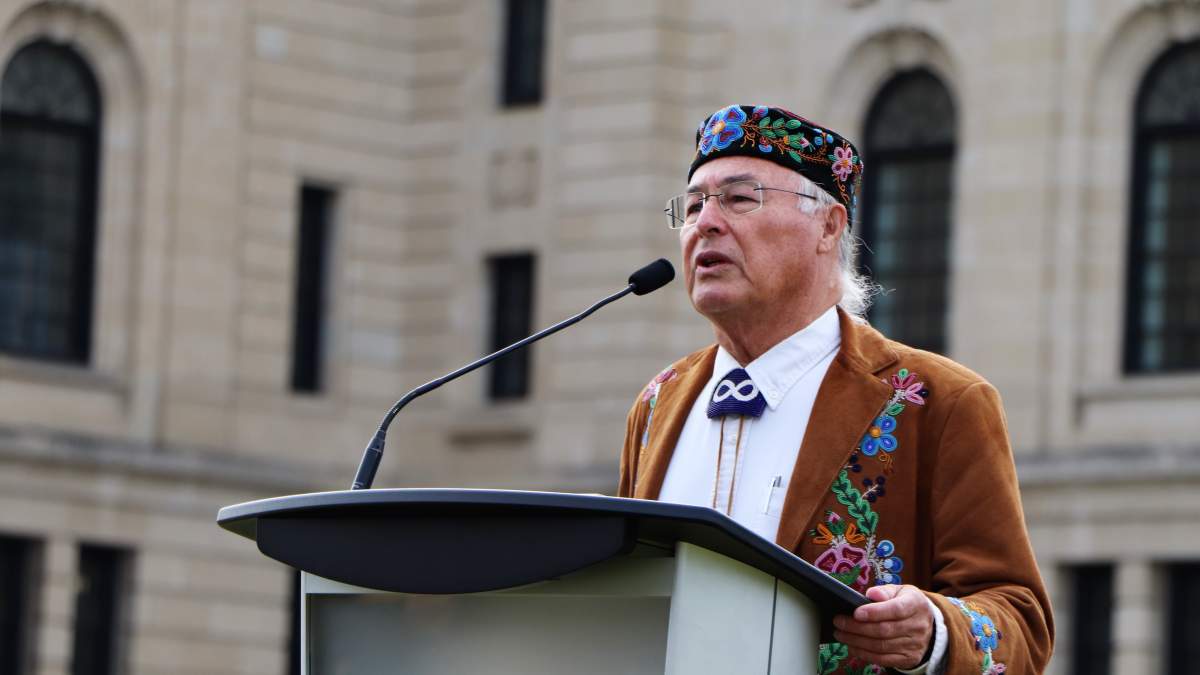A legal group is asking the Saskatchewan government to recognize the right of Métis people in the Qu’Appelle Valley and area, including the city of Regina, to harvest fish and wildlife for food.

The Métis Legal Research and Education Foundation held a press conference outside the Saskatchewan legislature Thursday to bring public attention to the issue.
Foundation chair, lawyer and former Métis National Council president Clément Chartier said the right to harvest in the area was determined by a provincial court decision in 2007.
“We believe it doesn’t matter which part of our homeland you live in, as a Métis person you have those (constitutional) rights, and governments and their courts must begin recognizing that,” Chartier said.
This comes one day after the Métis Nation – Saskatchewan (MN-S) launched a lawsuit against the province, claiming the government is not doing enough to consult over issues like land use, and commercial activities like trapping and fishing.
The foundation pointed to the 2002 case of Donald Belhumeur, a Métis man living in Regina who was fined for fishing without a licence at Katepwa Lake in the Qu’Appelle Valley.
Belhumeur had shown conservation officers his MN-S membership card at the time.
In October 2007, provincial court Judge Diane Morris found Belhumeur not guilty of illegal angling, recognizing his right to fish for food pursuant to section 35 of the Constitution Act.
Morris also noted that the regional community these rights pertain to included the Qu’Appelle Valley and environs, which extends to the city of Regina.
While the Saskatchewan government appealed the decision, it withdrew that appeal in 2015.

Get breaking National news
Chartier said despite that, the province has continued to ignore the extended jurisdictions for Métis hunters and fishers.
“How can this government’s violation of a clear court decision be reconciliation? You know, how can it be just? So that’s something they will have to answer,” he said.
On Wednesday, Chartier sent a letter on behalf of the foundation to Saskatchewan minister of justice and attorney general, Don Morgan. In it, Chartier urged Morgan to “rectify this most egregious injustice.”
The lawyer also pointed to the most up-to-date Treaty and Aboriginal Rights for Hunting and Fishing Guide, from the Saskatchewan Department of Environment, dated December 2018.
“You can’t paint a First Nations man differently than a self-identified Métis citizen. We’re together on this.”
That guide currently recognizes Métis Aboriginal rights in northern Saskatchewan, within specified harvesting zones.
It also states, “recognized individuals may exercise Métis Aboriginal rights within the Métis Harvesting Zone(s) in which their historic Métis community is located.”
According to the guide, in all other areas of the province, “Métis Aboriginal rights are not currently recognized.”
Brendan Morin, a self-identified Métis citizen living in Regina, called the current language “vague,” adding it’s confusing for hunters and conservation officers.
Morin told Global News he was out hunting in the Kenosee Lake area, which falls within the Qu’Appelle Valley, on Sept. 12 when he was stopped by conservation officers.
“Given my Métis ancestry, I gave him my Métis citizenship card and told them that I was out hunting with family members and we wanted to just get our food,” he said.
Morin said the officers seized his gun and the elk he had killed to feed his family. However, the officers didn’t know what to make of his Métis card.
“It was very confusing … and they don’t know what they’re doing either. And it was obvious,” he said. “The minute that my status family members (returned), things changed.”
Morin said at that point, the officers released his gun and the meat before receiving two fines, totalling $4,000.
“You can’t paint a First Nations man differently than a self-identifed Métis citizen. We’re together on this,” he said.
“When stuff like this happens over just miscommunication and not understanding how to deal with the situation, it’s very disheartening to believe in our provincial and federal government as them doing everything possible to try and help with reconciliation.”
The entirety of southern Saskatchewan falls within Treaty 4, and a portion of Treaty 2, territory. Both territories include the traditional homeland of the Métis people.
Morin said he plans to fight the fines, and knows of other Métis hunters and fishers across Saskatchewan with similar claims.
In an email statement to Global News Thursday, the Saskatchewan Ministry of Justice said the government respects and honours the decisions of the courts in the province with respect to all matters.
It noted the government is “not aware of the prosecution of any hunter or fisherman asserting Métis rights in the Qu’Appelle Valley region since the Belhumeur decision.
The province has recently embarked on negotiations with the Métis Nation–Saskatchewan with respect to Métis harvesting rights in Saskatchewan.”
In closing, the ministry states these are issues that can and will be dealt with in a cooperative spirit with the Métis Nation–Saskatchewan, “which we look forward to pursuing.”









Comments